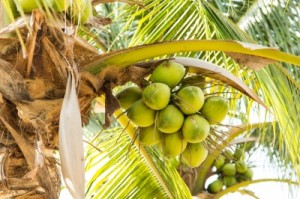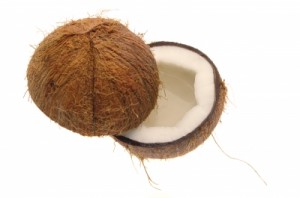
photo credit
Click here for parts one and two if you haven’t read them already! :)
Now that we’ve talked about why coconut isn’t bad for you, let’s consider the vast majority of benefits it provides. An article by the Coconut Research Center states,
“If you do a search on PubMed for ketones, as they relate to MCTs and diet, you will find about 25,000 studies. Combining these studies with the 10,000 on coconut oil and MCTs, we have a total of over 35,000 studies describing the effects of coconut oil on health. Is that enough evidence? There is far more evidence demonstrating the safety and efficiency of coconut oil than there are for most FDA approved drugs.” (Fife, 2012)
Let’s consider how coconut oil relates to obesity, diabetes, viral diseases, heart health, Alzheimers, and toxins in the body. Because coconut oil is one of the best sources of MCTs, it provides incredible health benefits.
Obesity is one of the biggest and fastest growing health problems in America. In the 1980s researchers started investigating the use of MCTs and weight loss. Researchers from McGill University are now recommending coconut oil for weight loss in Canada and elsewhere. Why is this? Because research concludes that the consumption of foods containing medium chain triglycerides (like coconut oil) boosts the metabolism and diminishes fat deposition. (Fife, 2012) Indeed, consider this rather humorous experiment done by farmers back in the 1940s: they tried feeding their cows coconut oil, assuming it would help them grow big and fat. But their plan backfired, and the cows instead became lean and active. This was certainly not the result they were hoping for, but it’s an interesting example of what coconut oil does in the body! (Mercola, 2011)
Coconut oil is also beneficial for those with diabetes, because it helps to stabilize blood sugar levels by improving insulin sensitivity and secretion. Thus it helps to treat the root cause of diabetes. (Fife, 2012)
In 1960, Jon J. Kabara, PhD and a professor of pharmacology at Michigan State University, discovered the incredible antimicrobial effects of MCTs. Vast amounts of research has indicated that MCTs are capable of killing disease-causing viruses, fungi, parasites, and bacteria. Used both topically and internally, MCTs are used to prevent and fight off infectious diseases. Because coconut oil is mostly composed of MCTs, it can be used as a powerful antimicrobial in the body, as evidenced in laboratory and clinical studies. (Fife, 2012)
But what about heart disease? Surely if people are consuming so much saturated fat they will be at higher risk for this deadly killer. Research has supported otherwise. In fact, MCTs are readily used by the heart as fuel because of the “ketones.” While some MCTs are used immediately to produce energy, others are converted into these ketones, which are a superfuel for the heart and the brain. They have shown to increase oxygen delivery by 39 percent and heart function by 28 percent. They are now being recommended by researchers at University François Rabelais in Francbe as a treatment for curing heart disease! So coconut oil is not only NOT harmful to the heart, but it has also been shown to have a therapeutic effect on the heart! (Fife, 2012)
The ketones produced from MCT metabolism has also been shown to reduce neurological disorders such as Alzheimer’s disease, Parkinson’s disease, Huntington’s disease, ALS, stroke, narcolepsy, brain trauma, and brain cancer. They can prevent and reverse these diseases by providing high quality energy for the brain and activating proteins for brain cell maintenance, repair, and growth. It is now being used to treat such diseases and has proved to be a successful dietary treatment for such diseases. (Fife, 2012)
Coconut oil has also been shown to negate the effects of cancer, evidence of its anti-cancer properties. When cancer is chemically induced in lab animals and then coconut oil is added to their diets, the oil has shown to actually negate the carcinogenic effect of those chemicals. Coconut oil can also reverse the effect of toxic substances such as alcohol, bacteria, chemicals, and drugs in places such as the liver, intestines, colon, kidneys, and pancreas. (Fife, 2012)
With so much evidence and research supporting the use and consumption of coconut oil, it is hard to doubt its benefits. So much of the public has been falsely informed, but in time the negative assumptions behind coconut oil will diminish and disappear altogether as it is proven over and over again as a super food. Indeed, fats in their natural form as a whole are a critical and key component of a healthy diet, and it is important to be well-informed and make wise choices about what we eat.
So in conclusion, yes, the soft white lump on the spoon I offered my friend was indeed a saturated fat. But there is so much more to the story. Oh, do I have some things to tell her now! :)
Sources:
Fife, Bruce. “The Coconut Oil Miracle: Where is the Evidence?” Coconut Research Center, 2012. Web. Accessed July 10, 2013 from
[http://www.coconutresearchcenter.org/The%20Coconut%20Oil%20Miracle-Where%20is%20the%20Evidence.htm]
Mercola, Joseph. “Coconut Oil Benefits: When Fat is Good For You.” The Huffington Post, February 14, 2011. Web. Accessed July 10, 2013 from
[http://www.huffingtonpost.com/dr-mercola/coconut-oil-benefits_b_821453.html]
***In my next post, I’ll finish out the series by briefly covering some great coconut oil sources and ways to include coconut oil in your diet!


